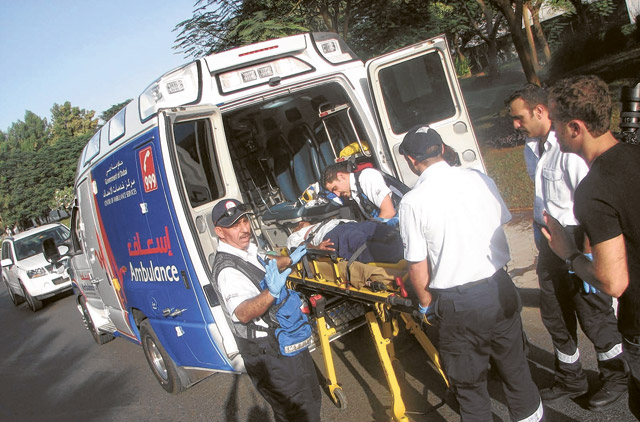Dubai: Timely intervention by paramedics and doctors saved the life of a 51-year-old patient who suffered from brain haemorrhage, the Dubai Corporation for Ambulance Services (DCAS) has said.
The Indian patient had suddenly collapsed and dropped unconscious to the ground in his apartment, said a spokesperson from DCAS. Paramedics were later alerted to the incident and rushed to the apartment where they attended to the patient before transferring him to the hospital.
“Paramedics quickly responded to the reported incident and rushed to the apartment to save the patient. He had very low blood pressure and shallow respiration. They administered cardiopulmonary resuscitation, a procedure to support and maintain breathing for those individuals who have had a cardiac arrest. however, the patient remained in a coma and was immediately transferred to the hospital.”
The patient was transferred to International Modern Hospital to receive the necessary treatment to stop the bleeding in his brain, where he was attended to by Dr Hillol Kanti Pal, consultant neurosurgeon at International Modern Hospital. A CT scan confirmed blood leakage around the brain and the patient was unable to move his limbs, a report said.
He had also suffered from cranial nerve paralysis due to high pressure within the skull. A scan revealed the deleterious effects of severe bleeding in the brain leading to infarctions in the brain vessels.
Dr Pal said the patient’s chance of survival was bleak, but thanks to the extraordinary efforts of the neuro team of doctors, the patient slowly began to restore movement of his limbs.
The patient’s condition stabilised after three weeks of intensive therapy. After six weeks of admission tests showed that the blister that had burst in the brain had healed spontaneously by clot formation.
“The patient is now conscious and responding to simple commands. The power in all limbs has improved; the upper limbs show better power and coordination than lower limbs. His haemorrhage was due to severe uncontrolled hypertension,” Dr Pal said.









